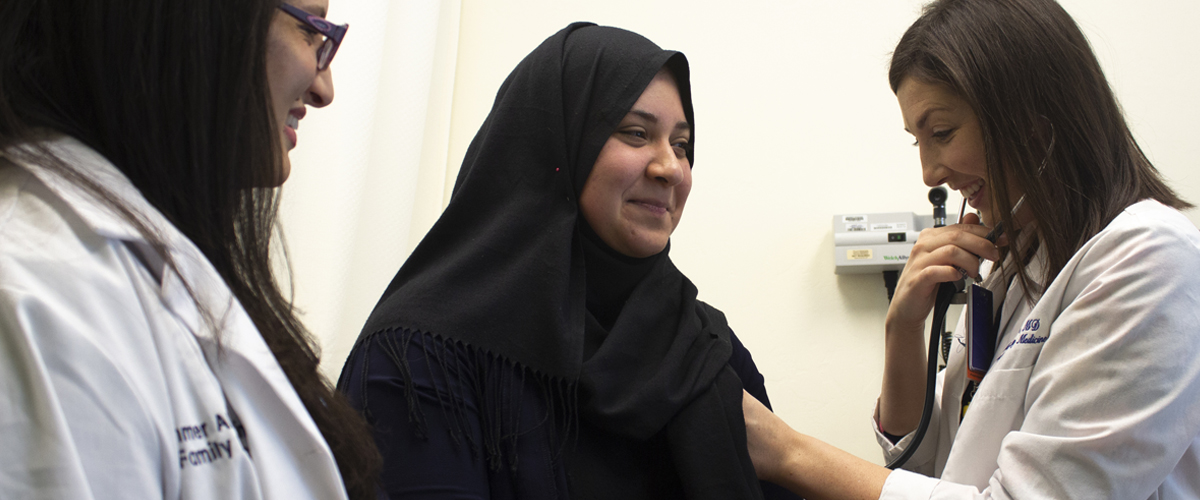Background
There are more than 3 million refugees who have been resettled in the U.S. since 1975, most of whom have fled their country of origin for fear of persecution. Refugees in the U.S. often have histories marked by violence, trauma, and substandard living conditions in an intermediate country. Although refugees are often provided with resources immediately upon arrival the U.S., including case managers, social workers, financial support, housing, and help enrolling in service, these services are most often discontinued before the refugees are fully self-sufficient. Arizona is sixth for refugee resettlement in the US and because of this, over 20% of the patients in our two residency clinics are refugees. Our refugees are from many countries, but we have large populations from Somalia, DRC, Rwanda, Eretria, Ethiopia, the Sudan, Iraq, Syria, Afghanistan, Ukraine, Guatemala, and Cuba.
In the U.S., Refugees are an underserved patient population who experience significant health disparities and pose unique challenges to the delivery of primary care. Refugees often have limited healthcare literacy and English proficiency and acculturation issues, along with complex and/or multiple medical problems, including tropical and infectious diseases, and mental health needs. U.S.-trained physicians are often not equipped to deal with these issues in a typical 15-minute office visit. One of our goals as a residency is to give residents concentrated time and a curriculum to learn how to care for refugee populations in their future practices.
We have two different clinical experiences involving refugee patients:
- Our Refugee Complex Care Clinics and
- New Refugee Health Screening Clinics
We see refugees of all ages including pregnant patients in both of these clinics.
 Refugee Complex Care Clinic
Refugee Complex Care Clinic
- These clinics are meant for some of our most complicated refugee patients. Referrals to our refugee clinic are typically internal, although we have a relationship with local refugee resettlement agencies and our Infectious Disease Department who complete refugee immigration intake examinations. They are conducted twice a month at each clinic (Alvernon and South).
- Common referrals we get are: new HIV positive patients, patients with latent TB who need treatment, patients with severe PTSD, patients with parasitic illnesses or undifferentiated illnesses, patients who need good med reconciliation, patients who need paperwork (especially the N-648 form) filled out, patients who have multiple complicated medical issues, and a multitude of other issues.
- Our care team is comprised of 2 designated attendings who have expertise in the care of refugees; two residents; medical students; a lawyer who is part of our medical-legal partnership TFAP); a dedicated nurse; a refugee health navigator, a pharmacy resident and public health intern.
- The day starts at 8 AM with a 10-minute refugee related teaching pearl done by the attending or resident of the day, followed by a team huddle where each patient has their chart reviewed to identify gaps in care and a care plan is developed.
- Each patient is scheduled for an hour appointment to allow the patients and physicians the time that is needed to adequately address the patient’s needs.
Please see recent publication on our innovative complex care clinic for more details. https://www.aafp.org/pubs/fpm/issues/2022/0700/refugee-clinic.html
New Refugee Health Screening Clinics
- The CDC developed domestic and overseas medical screening guidance for healthcare providers who may see refugees during the resettlement process. This guidance aims to: promote and improve refugee health, prevent and identify disease, and familiarize refugees with the US healthcare system.
- Our screening clinics are done in conjunction with the refugee resettlement agencies in Tucson who we partner with and are done within 30days of the refugees arriving to the US (we have between 5-7 clinics a month).
- The exams are comprehensive medical exams that screen for a wide range of communicable and non-communicable conditions (including TB, HIV, GI parasites, hepatitis, STIs, diabetes, hypertension, pregnancy, and other). We also give immunizations at the visits.
- We then establish the patients in our clinics to continue care! These clinics are the patients first interaction with the healthcare system in the US and our favorite part is welcoming people warmly to our country!
Refugee Health Curricular Elements
We have several curricular components throughout residency aimed at caring for refugees.
During orientation:
- Introduction to refugee resettlement and health, and introduction to the care of refugees.
During Teaching Days:
- There are several global health teaching days dedicated to different aspects of care of refugees given by experts in the field. Our colleagues at the refugee resettlement agencies come to give us talks as well.
During Clinics:
- A refugee health related pearl is done at the start of each clinic on a variety of topics (both health related and political).
Research:
- Many residents conduct their scholarly projects on refugee related issues. The complex care clinic originally arose from a resident project.




